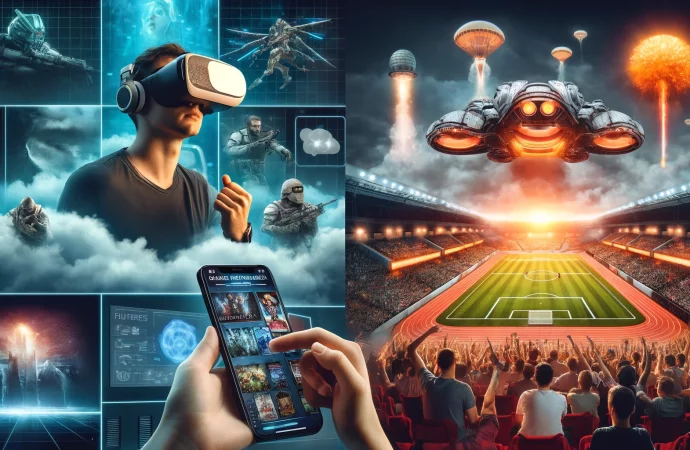Introduction The intersection of gaming and entertainment has become one of the most dynamic evolutions in media today. As gaming grows beyond consoles and PCs to encompass virtual reality (VR), streaming platforms, and even television, its influence on broader entertainment sectors is undeniable. This article will explore the role of gaming in entertainment and television,
Introduction
The intersection of gaming and entertainment has become one of the most dynamic evolutions in media today. As gaming grows beyond consoles and PCs to encompass virtual reality (VR), streaming platforms, and even television, its influence on broader entertainment sectors is undeniable. This article will explore the role of gaming in entertainment and television, its current state, and where it is heading.
The Rise of Gaming in Mainstream Entertainment

Image by: Yandex.com
Over the past decade, gaming has transformed from a niche hobby into a central component of the entertainment industry. Once considered a pastime for a specific group, gaming now appeals to a broad audience of different ages, genders, and demographics. This shift has been driven by the evolution of game design, the accessibility of mobile devices, and the increasing sophistication of gaming platforms.
Gaming is no longer confined to video game consoles. With the rise of smartphones and cloud-based gaming, millions of people can now access high-quality games without the need for expensive hardware. As a result, gaming is now a multi-billion-dollar industry, with projected revenues to surpass traditional television and film in the near future.
Gaming and Television: A Symbiotic Relationship

Image by: Yandex.com
Television has not only adapted to gaming culture but has also started integrating gaming elements into its content. Popular game-themed shows like The Witcher and The Last of Us have brought gaming narratives to life on screen, creating a cross-pollination between television and gaming entertainment. This symbiotic relationship allows gaming studios to broaden their audience reach while TV shows benefit from the pre-existing fanbases of popular games.
Moreover, interactive television, where viewers can influence plot directions (as seen in Netflix’s Black Mirror: Bandersnatch), further blurs the line between traditional TV and gaming. This trend opens the door to new storytelling possibilities that merge passive entertainment with active participation.
Convergence and Cross-Media Synergies

Image by: Yandex.com
One of the most significant trends in recent years is the cross-media convergence between gaming and television. Popular games like The Witcher and Arcane have been adapted into successful TV series, while some TV shows like Stranger Things have been transformed into video games. This synergy demonstrates how the two industries are increasingly blending, capitalizing on each other’s storytelling and fanbase potential. Moving forward, the lines between gaming and television are likely to blur even further, with both industries experimenting with interactive formats, expanding audience reach, and reshaping entertainment consumption.
Impact on Television Networks and Streaming Platforms

Image by: Yandex.com
Television networks and streaming platforms are beginning to acknowledge the growing influence of gaming. Some are even making strategic moves to incorporate gaming into their business models. For instance, Netflix recently expanded its offerings to include mobile games, signaling a shift in how streaming services are thinking about entertainment.
This convergence of gaming and television is changing the way content is consumed. Traditional TV is evolving to meet the demands of a generation that expects interactivity, instant access, and control over their entertainment experiences. By embracing gaming, television networks and streaming platforms can appeal to younger audiences and stay relevant in an increasingly competitive entertainment landscape.
The Role of Esports in the Future of Gaming Entertainment

Image by: Yandex.com
Esports, or competitive gaming, has become a global phenomenon. With tournaments broadcast on television and streaming platforms like YouTube and Twitch, esports is breaking into the mainstream and attracting millions of viewers worldwide. Major TV networks, including ESPN, have begun to televise esports events, demonstrating the growing integration of gaming into traditional entertainment formats.
Esports offers a unique viewing experience, blending elements of traditional sports broadcasting with the fast-paced action of video games. As its popularity continues to grow, it is likely to play an even more significant role in the future of gaming entertainment.
Platform Distribution and Accessibility

Image by: Yandex.com
Gaming has transformed how users access content, moving from physical consoles to PC, mobile, and cloud gaming platforms. This diversification has made games more accessible to a global audience, lowering entry barriers and increasing reach. Television, while also making strides through streaming services like Netflix and Disney+, is still transitioning away from traditional cable and satellite systems. However, TV remains more platform-restricted, whereas gaming’s cloud and mobile platforms have made it possible for players to engage with games anywhere, anytime, with minimal equipment.
Challenges Facing the Gaming Entertainment Industry

Image by: Yandex.com
Despite its rapid growth, the gaming entertainment industry faces several challenges. One key issue is accessibility, particularly for those without reliable internet connections or the means to afford gaming hardware. Furthermore, concerns about inclusivity, representation, and toxicity in gaming communities need to be addressed as gaming continues to gain influence in mainstream entertainment.
Another challenge is the sustainability of monetization strategies like microtransactions and in-game purchases, which have caused controversy among gamers and policymakers alike. As the industry grows, it will need to balance profitability with user satisfaction and ethical business practices.
Audience Engagement and Social Interaction

Image by: Yandex.com
Gaming thrives on real-time interaction, both with the game itself and with other players globally. Multiplayer games, streaming platforms like Twitch, and gaming communities create spaces for social interaction and shared experiences. In contrast, TV remains a more solitary experience, with engagement limited to social media commentary or fan discussions post-viewing. The live interaction in gaming enhances audience loyalty and keeps players engaged for extended periods, whereas television, despite live tweeting and fan communities, lacks the same level of direct interaction.
The Future of Gaming as a Form of Entertainment

Image by: Yandex.com
The future of gaming entertainment will be driven by emerging technologies. Virtual reality (VR), augmented reality (AR), and artificial intelligence (AI) are already reshaping how people experience gaming. With VR, gamers are fully immersed in digital worlds, experiencing entertainment in ways that television and film cannot offer. Meanwhile, AR layers virtual elements over the real world, creating a hybrid gaming experience that can be enjoyed in real time.
Cloud gaming is another innovation that promises to revolutionize the industry. By allowing users to stream games directly from servers without the need for powerful hardware, cloud gaming services such as Google Stadia and Xbox Cloud Gaming make high-quality gaming accessible to even casual players. This democratization of gaming entertainment will likely continue to expand its audience.
Comparative Analysis Table
| Category | Gaming | Television | Analysis/Comparison |
|---|---|---|---|
| Content Creation | User-generated content, interactive, open-world | Scripted, episodic, linear narratives | Gaming promotes user agency and interaction, while TV follows traditional storytelling with limited viewer control. |
| Audience Engagement | Highly interactive, multiplayer, global reach | Passive viewership, limited interactivity | Gaming fosters real-time interaction, often with social elements (multiplayer), while TV remains more passive. |
| Technological Integration | AI, VR/AR, blockchain, cloud gaming | AI for recommendations, 4K/8K resolution | Gaming is at the forefront of emerging tech, like VR/AR, offering immersive experiences, while TV adapts slower to tech. |
| Business Models | Freemium, subscription services, microtransactions | Subscription-based, ad-supported | Both are leaning toward subscription models, but gaming capitalizes more on in-game purchases and microtransactions. |
| Monetization | In-game purchases, live streaming, eSports | Ads, subscriptions, product placement | Gaming’s eSports and streaming markets have expanded revenue opportunities beyond ads and subscriptions, unlike traditional TV. |
| Platform Distribution | Consoles, PC, mobile, cloud gaming | Cable, satellite, streaming platforms | Gaming is diversifying with mobile and cloud gaming, while TV is transitioning from traditional to streaming platforms. |
| Cultural Influence | Gamification of education, workplace, social trends | Influences pop culture, social movements | Gaming is reshaping education and work through gamification, whereas TV primarily influences cultural trends and discussions. |
| Evolving Formats | Interactive storytelling, immersive experiences | Live TV, reality shows, scripted dramas | Interactive storytelling in gaming is growing, with branching narratives, while TV remains more traditional in format. |
| Streaming Integration | Twitch, YouTube Gaming, live interaction | Netflix, Disney+, Hulu | Gaming content thrives on live interaction platforms, while TV streaming is focused on curated and on-demand content. |
| Audience Demographics | Younger, diverse, global | Broad, but skewed towards older generations | Gaming attracts a younger and more global audience, while TV appeals to broader but older demographics. |
| Cross-Media Convergence | Game adaptations into movies, TV series (e.g., The Witcher) | TV shows turning into video games (e.g., Stranger Things) | Increasing synergy as both industries are adapting content into each other’s platforms. |
| Future Trends | Metaverse, decentralized gaming, AI-driven narratives | Interactive TV, enhanced streaming, AI-based recommendations | Both gaming and TV are converging towards interactive, AI-driven experiences, though gaming is leading the charge. |
Conclusion: Gaming’s Place in the Future of Entertainment
The future of gaming in entertainment and television is incredibly promising. With the continued development of new technologies and the rise of esports, gaming is set to play a central role in shaping how people engage with entertainment. Television networks, streaming services, and gaming companies will need to collaborate to meet the evolving demands of audiences seeking more interactive, immersive, and personalized experiences.
Gaming is no longer an isolated industry it is an integral part of the entertainment landscape. As the lines between gaming, television, and other forms of media continue to blur, we can expect a future where interactive entertainment becomes the norm.
















